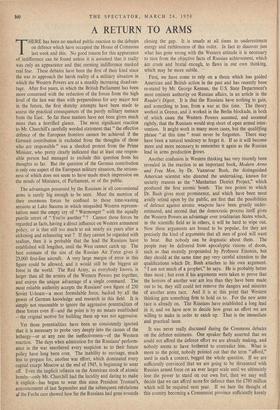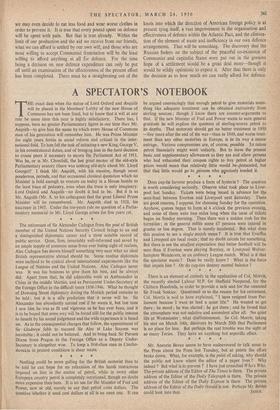A RETURN TO ARMS
THERE has been no marked public reaction to the debates on defence which have occupied the House of Commons last week and this. No good reason for this appearance of indifference can be found unless it is assumed that it really was only an appearance and that seeming indifference masked real fear. These debates have been the first of their kind since the war to approach the harsh reality of a military situation in which the Western Powers are at a steadily increasing disadvan- tage. After five years, in which the British Parliament has been more concerned with the reduction of the forces from the high level of the last war than with preparedness for any major test in the future, the first sketchy attempts have been made to assess the practical consequences of the purely military menace from the East. So far these matters have not been given much more than a horrified glance. The most significant reaction to Mr. Churchill's carefully worded statement that " the effective defence of the European frontiers cannot be achieved if the German contribution is excluded from the thoughts of those who are responsible " was a shocked protest from the Prime Minister, who pretty clearly indicated that at least one respon- sible person had managed to exclude this question from his thoughts so far. But the question of the German contribution is only one aspect of the European military situation, the serious- ness of which does not seem to have made much impression on the minds of Ministers, of Parliament, or of the public.
The advantages possessed by the Russians in all conventional arms is surely big enough to be seen. Must the mention of their enormous forces be confined to those time-wasting sessions at Lake Success in which misguided Western represen- tatives meet the empty cry of " Warmonger " with the equally puerile retort of " You're another " ? Cannot those forces be regarded as facts, having a direct influence on Western armament policy, or is that still too much/to ask nearly six years after a sickening and exhausting war ? If they cannot be regarded with realism, then it is probable that the lead the Russians have established will lengthen, until the West cannot catch up. The best estimate of the size of the Russian Air Force gives it 25,000 first-line aircraft. A very large margin of error in this figure could be allowed, and it would still be the biggest air force in the world. The Red Army, as everybody knows, is larger than all the armies of the Western Powers put together, and enjoys the unique advantage of a single command. The most reliable authority accepts the Russians' own figure of 250 Soviet U-boats—a most formidable force, backed by all the power of German knowledge and research in this field. It is simply not reasonable to ignore the aggressive potentialities of these forces even if—and the point is by no means "established —the original motive for building them up was not aggressive.
Yet those potentialities have been so consistently ignored that it is necessary to probe very deeply into the causes of the lethargy—or at any rate the ineffectiveness—of the Western reaction. The days when admiration for the Russians' perform- ance in the war smothered every suspicion as to their future policy have long been over. The inability to envisage, much less to prepare for, another war effort, which dominated every capital except Moscow at the end of 1945, is beginning to wear off. Even the implicit reliance on the American stock of atomic bombs—only Mr. Churchill had the lucidity and daring to make it explicit—has begun to wear thin since President Truman's. announcement of last September and the subsequent revelations of the Fuchs case• showed how far the Russians had gone towards closing the gap. It is unsafe at all times to underestimate energy and ruthlessness of this order. In fact to discover just what has gone wrong with the Western attitude it is necessary to turn from the objective facts of Russian achievement, which are crude and brutal enough, to flaws in our own thinking, which may be more subtle.
First, we have come to rely on a thesis which has guided American and British action in the past and has recently been re-stated by Mr. George Kennan, the U.S. State Department's most eminent authority on Russian affairs, in an article in the Reader's Digest. It is that the Russians have nothing to gain, and something to lose, from a war at this time. The theory worked in Greece, and it worked in the Berlin blockade, in both of which cases the Western Powers assumed, and assumed rightly, that the Russians would stop short of open armed inter- vention. It might work in many more cases, but the qualifying phrase " at this time " must never be forgotten. There may have been a natural tendency to forget it. If so it will become more and more necessary to remember it again as the Russian lead in arms production grows.
Another confusion in Western thinking has very recently been revealed in the reaction to an important book, Modern Arms and Free Men, by Dr. Vannevar Bush. the distinguished American scientist who directed the undertaking, known for security reasons as the "Manhattan District Project," which produced the first atomic bomb. The two points to which Dr. Bush gives most prominence, and which have been most avidly seized upon by the public, are first that the possibilities of defence against atomic weapons have been greatly under- estimated, and second that the democratic process itself gives the Western Powers an advantage over totalitarian States which, in the scientific field as in others, it will be hard to wipe out. Now these arguments are bound to be popular, for they are precisely the kind of arguments that all men of good will want to hear. But nobody can be dogmatic about them. The people may be delivered from apocalyptic visions of doom, such as that recently propounded by Professor Einstein, but they should at the same time pay very careful attention to the qualifications which Dr. Bush attaches to his own argument. " I am not much of a prophet," he says. He is probably better than most ; but even if his arguments were taken to prove that the horrors of another war are less than they have been made out to be, they still could not remove the dangers and miseries of another arms race. And it is at this point that Western thinking gets something firm to hold on to. For the new arms race is already on. The Russians have established a long lead in it, and we have now to decide how great an effort we are willing to make in order to catch up. That is the immediate and practical issue.
It was never really discussed during the Commons debates on the defence estimates. One speaker flatly asserted that we could not afford the defence effort we are already making, and nobody seems to have bothered to contradict him. What is more to the point, nobody pointed out that the term " afford," used in such a context, begged the whole question. If we are sufficiently convinced that we are going to be threatened with Russian armed force on an ever larger scale until we ultimately lose the power to stand on our own feet, then we may well decide that we can afford more for defence than the £780 million which will be required next year. If we hate the thought of this country becoming a Communist province sufficiently keenly we may even decide fo eat less food and wear worse clothes in order to prevent it. It is true that every pound spent on defence will be spent with pain. But that is true already. Within the limit of our production and the aid we receive from our friends, what we can afford is settled by our own will, and those who are most willing to accept Communist domination will be the least willing to afford anything at all for defence. For the time being a decision on new defence expenditure can only be put off until an examination of the effectiveness of the present effort has been completed. There must be a straightening out of the knots into which the direction of American foreign policy is at present tying itself, a vast improvement in the organisation and effectiveness of defence within the Atlantic Pact, and the elimina- tion of the element of waste and inefficiency in our own defence arrangements. That will be something. The discovery that the Russian feelers on the subject of the peaceful co-existence of Communist and capitalist States were put out in the genuine hope of a settlement would be a great deal more—though it would be wildly optimistic to expect it. After that there is only the decision as to how much we can really afford for defence.































































 Previous page
Previous page